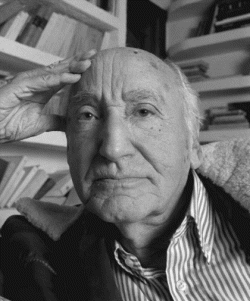

Partner Vicente Aleixandre
Queer Places:
IES Carlos Bousoño, C. de los Pinos, 10, 28221 Majadahonda, Madrid, Spain
 Carlos Bousoño (9 May 1923 – 24 October 2015) was a Spanish poet and literary critic. His work is frequently associated with the post-Spanish Civil War literary group.
Bousoño was a recipient of both the National Prize for Spanish Literature and the Prince of Asturias Award for Literature. Vicente Aleixandre's
bisexuality was well known to his circle of friends, but he never admitted it
publicly. He had a long-term love relationship with Carlos Bousoño.
Carlos Bousoño (9 May 1923 – 24 October 2015) was a Spanish poet and literary critic. His work is frequently associated with the post-Spanish Civil War literary group.
Bousoño was a recipient of both the National Prize for Spanish Literature and the Prince of Asturias Award for Literature. Vicente Aleixandre's
bisexuality was well known to his circle of friends, but he never admitted it
publicly. He had a long-term love relationship with Carlos Bousoño.
Bousoño was born in Boal, Asturias, in 1923. At the age of two his parents moved to Oviedo, where they spent their childhood and adolescence. He studied the first two years of the career of Philosophy and Letters in Oviedo and moved to Madrid at the age of nineteen to conclude them in 1946 at the Central University, today Complutense, with an extraordinary prize. At that same university he received his doctorate in 1949 with the first thesis in Spain on a writer still alive, Vicente Aleixandre, poet of the Generation of 27 later awarded the Nobel Prize for Literature (1977). His thesis was published with great success (La poesía de Vicente Aleixandre, 1950) and is still considered today the best and most profound study of the poetry of this author. In 1951 he published with Dámaso Alonso, his great teacher and companion within the stylistic discipline, Seis calas en la expresión literaria española, his best known theoretical book, several times republished and expanded, Teoría de la expresión poética (1952). Among his fundamental works it is also worth mentioning The Poetic Irrationalism. (The Symbol) (1977), Poetic Superrealism and Symbolization (1978) and a very ambitious work that did not come to conclusion: Literary Epochs and Evolution (1981). He gathered his complete poetry in 1998, revised under the title Spring of Death. He married Ruth, a Puerto Rican former student with whom he had two children, in 1976 and taught Spanish literature at several American universities (Wellesley, Smith, Vanderbilt, Middlebury, New York University, among others). He taught the subject of stylistics at the Complutense University of Madrid, of which he was in his last years professor emeritus. He won the Fastenrath Prize of the Royal Spanish Academy in 1952 and was appointed a full member of the same in 1979, delivering his entrance speech in 1980. A year earlier, he had won the National Essay Prize for Poetic Irrationalism and Symbolism. In 1990 he was awarded the National Poetry Prize for ''Metaphor of the lack of immunity'', a key book in his evolution from realism to symbolism and was named doctor honoris causa by the University of Turin. In 1993 he won the National Prize for Spanish Literature and in 1995 he received the Prince of Asturias Award for Letters. He was also an Honorary Fellow of the Hispanic Society of America and Honorary President of the Loewe Poetry Prize, one of the most important in Spain. He was also a finalist on two occasions for the Reina Sofía Prize for Ibero-American Poetry (May 1993 and June 1994) and in December 2000 he was a candidate for the Cervantes Prize, in which he was among the four finalists, an award for which he also competed in 1998, 2001 and 2002. For many years he was voted as the best professor of the Complutense University. He was also an outstanding lecturer. His classes at the Complutense University were always master classes that Bousoño said without looking at a single note. His fame as a teacher led to his classrooms to significant poets and writers who studied at the Complutense University.
Among his best friends in the literary field it is worth mentioning, apart from Vicente Aleixandre himself, whose archive he inherited, Francisco Brines, Claudio Rodríguez, Francisco Nieva, Mario Vargas Llosa, José Olivio Jiménez, and Giannina Braschi, among others. Throughout his life he maintained a close relationship of friendship with Vicente Aleixandre, from whom he received love correspondence that was not made public until his death. He died in Madrid on October 24, 2015 at the age of 92. At the time of his death he was the oldest scholar of the RAE.
My published books: